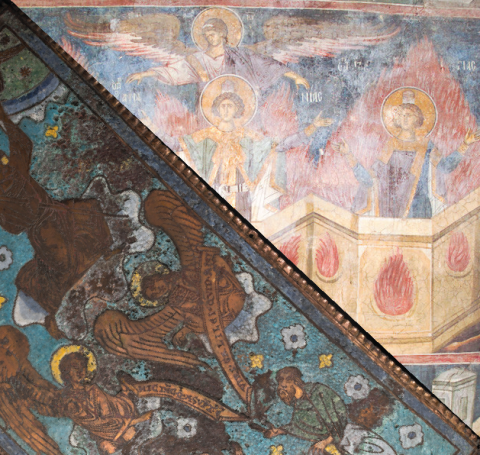
The department is pleased to announce the recipents of this year's Tanasa Award.
The premature death from cancer of Zvetlana Tanasa, one of the department’s Ph.D. students, ended the life of a remarkable person and a gifted young scholar. The people who knew Zvetlana best were moved to create the Tanasa Fund as a way to remember her distinct personality and her academic achievements. A number of professors generously offered portions of their honoraria to establish a financial base for a trust fund, the proceeds of which would be used to honor exceptional M.A. theses and to support additional research opportunities for students.
Markiian Kyrchiv was recognised on the basis of his success under exceptional circumstances. Under bombardment from the Russian invasion of Ukraine, including studying from within a bomb shelter, Markiian completed his MA within one academic year (within an overall mark of A- for his thesis). He submitted all required coursework, and produced and defended his thesis, as well as making excellent contributions to the life of the department. Markiian's thesis was on Genesis and functions of suburbs of Lviv, Krakow, and Wroclaw, 13th-15th century, supervised by Katalin Szende.
Bernát Rácz won for academic excellence. His research explores enamels discovered in Hungary and was called by his external reader sensational, rigorous and impressive, and the committee agreed that the distinguished external reader was approaching Bernat’s work as if it were the work of an established scholar. This award was given on the basis of the text of Bernát’s thesis, his performance at the defense, and his exceptional contributions to class work during the past academic year. His thesis was on The Reliquary of Pétermonostora: A Twelfth-Century Mosan Phylactery Discovered in Hungary, supervised by Béla Zsolt Szakács and József Laszlovszky.
Bernát also won the CEU Outstanding Academic Achievement Award for his work throughout his MA.
Andrei Dumitrescu also won the award on the basis of his academic excellence. He produced an outstanding study combining art historical and textual analysis of Byzantine material transferred into a different cultural and political context. His research explores pictorial cycles featuring Constantine the Great, Pope Silvester and the Archangel Michael at two Moldavian churches at Radauti and Balinesti and in so doing removes this material from an anachronistic nationalist context. He has studied a large number of often unexamined texts in different source languages (Latin, Greek, Old Church Slavonic). His thesis was entitled The Visionary Emperor: Constantine and the Archangel Michael in Late Fifteenth-Century Moldavian Representations, supervised by Baukje van den Berg.
Andrei also won the CEU Outstanding Academic Achievement Award for his work throughout his MA. His thesis was also awarded the Centre for Religious Studies' Best Dissertation Award.